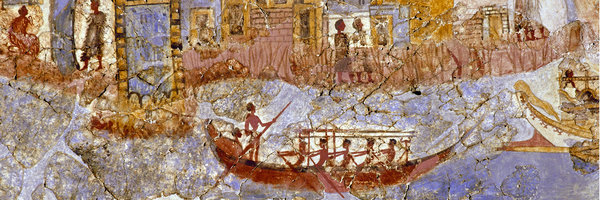
Shedding new light on the Ancient Mediterranean
Scientists from the Max Planck Institute for the Science of Human History in Jena and the Initiative for the Science of the Human Past at Harvard University in Cambridge, Massachusetts, are collaborating in a new Research Center devoted to the archaeological and scientific study of the ancient Mediterranean.
The first settlers in the Mediterranean crossed the sea to settle and connect with lively networks the various regions of northern Africa, western Asia and southern Europe. Intercultural encounters and exchanges, combined with extensive mobility of people, have characterized the development of the different cultures since then. Researchers at Harvard University and the Max Planck Institute for the Science of Human History in Jena, both leaders in this research area, are now turning their focus to these processes, which include the first "globalization" of the eastern Mediterranean area in the late Bronze Age and early Iron Age (ca. 1600-1000 BC) and the so-called "Phoenician" and "Greek" migrations in the early 1st millennium BC throughout the Mediterranean.
Thanks to the genomic revolution and accelerating progress in methods to analyze DNA from ancient skeletons, it is now possible to reconstruct the genomes of ancient people. These studies lead to entirely new insights into the genetic history of all continents. “DNA and isotope analyses of human skeletal remains are an effective tool to explore human mobility and biological relatedness in the past,” says Johannes Krause, director at the Max Planck Institute for the Science of Human History, one of the directors of the new research center.
Reconstructing the past
The scientists leading the new Max Planck-Harvard Research Center highlight its interdisciplinary approach. Alongside Krause, the co-director of the research cooperation will be Michael McCormick, Goelet Professor in the Department of History at Harvard University and Chair of the Initiative for the Science of the Human Past. Philipp W. Stockhammer of LMU Munich, Institute for Pre- and Protohistoric Archaeology and Archaeology of the Roman Provinces, and David Reich of Harvard Medical School, Department of Genetics, are the deputy directors of the Center.
Alongside ancient human mobility, the project also studies the ancient spread of infectious diseases. As Krause emphasizes, the movements of bacterial pathogen and human movement were likely as closely connected in ancient times as in modern ones. Pandemics could transform entire habitats and culminate in extensive movements of populations and deep cultural change. “By bringing together isotope, DNA and pathogen analyses with deeply researched historical and archaeological evidence, the researchers will draw a dynamic new picture of the ancient past,” summarizes co-director McCormick.
Harvard University and the Max Planck Society will each invest around 2.5 million Euros in the collaborative endeavor, initially planned for a period of five years. In addition to the bilateral use of existing facilities, the effort also includes integrated transatlantic Ph.D. programs of fully funded graduate students and constant transatlantic scientific interaction and meetings via the internet and on both sites, to produce a new generation of a new kind of researcher, as well as abundant new insights into the deep historical and biological forces that produced the modern world.